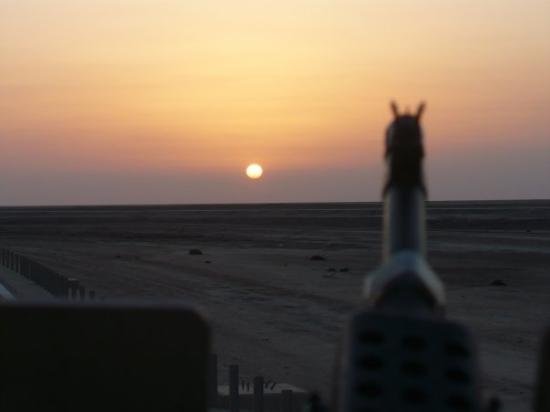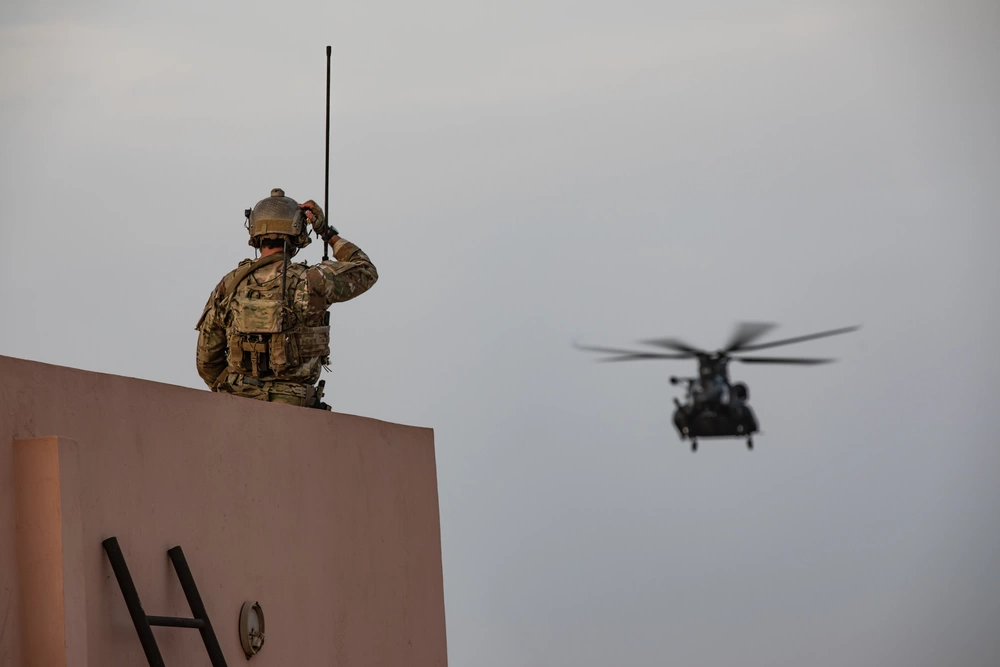
Amo Saddam
By E.C. Browne
Growing up in Detroit in the 90s, I had a decent amount of Iraqi friends. Some who still spent summers there with family members in Iraq. So before I even enlisted, I was privy to a pretty considerable amount of insider perspective about one man in particular: Saddam Hussein Abd al-Majid al-Tikriti. The name itself is a mixture of emotions, especially in the Gulf States. Of all the iconic leaders to stake their claim in the Gulf, why was this man so polarizing? It's like discussing politics at Thanksgiving dinner; you never really know where the conversation is going to end up. One thing's for sure though; the Gulf States had a serious love-hate relationship with the man many Iraqis affectionately referred to as Amo Saddam.
On one hand, he was seen as a sort of safeguard against Iran. But in the other, he also invaded Kuwait (and Saudi Arabia), which didn't really sit well with anyone in the neighborhood. Mind you, the Gulf States have their reasons, whether they're grounded in geopolitics, religion, or even just good old fashioned national interests. And that's exactly what I’m going to dive into in this article. Saddam Hussein was a complex and controversial figure that has been seen as both villain and hero, depending on who and when you ask.
The Rise of Saddam

Before I even talk about Saddam’s Jekyll-and-Hyde reputation, let's rewind the clock a bit to pre-Saddam Iraq. The country wasn't exactly Switzerland before Hussein came into the political scene. Iraq had its share of sociopolitical turbulence and was really trying to find its footing in a region governed by oil-rich monarchies. Then boom, 1979, in walks Saddam, with his Ba'athist ideology and, let's be honest, some pretty brutal ways of doing business. By the time he comes to power, the Gulf was already talking.
The oil-rich nations of the Gulf that make up one of the most strategically important regions in the world—had their antennae up from the get-go and Saddam was on their radar. Initially, the Gulf had a sort of inshallah reaction. A mix of cautious optimism and "let's wait and see." After all, they were dealing with their own issues, like trying to balance modernization with tradition while managing alliances with Western powers.
Hussein seemed like a strongman, and that appealed to many in a region that to this day calls for heavy-duty leadership. The Middle East isn't exactly a place where you can thrive being a pushover. But the whispers were already there; Hussein was ambitious (maybe too ambitious). And his ideas about Arab unity? Well, that could either go really well or lead to the kind of chaos the region was already too familiar with.
Now to be fair, Hussein did bring some good to Iraq at the onset of his tenure as president. He modernized infrastructure, boosted education, and even women's rights saw some improvement. But these points always get overshadowed by his iron-fisted governance. Think forced displacements, mass executions—you know, the kind of stuff that gives you dictator street cred. But it wasn’t long before the Gulf States began to split in their feelings about Saddam, especially when the Iran-Iraq War kicked off.
The Iran-Iraq War: A Divergence of Views on Saddam in the Gulf Begins

Alright, so let's cut to 1980, when the Iran-Iraq War breaks out. Now, this is where things start to get complicated. Iraq starts duking it out with Iran, who is this Shiite giant led by a man many around the world considered to be an absolute nutjob, Ayatollah Khomeini. It's not just a territorial dispute; it's an ideological face-off. You’ve got Sunni Iraq vs. Shiite Iran, Arab nationalism vs. Islamic revolution. And the Gulf States are kind of forced to grab a bucket of popcorn and watch all the carnage go down.
Most of the Gulf States lean Sunni and they're not exactly fans of the Iranian revolution that just toppled a Shah while screaming for the death of the West. It's like when your racist friend or family member finally goes off the deep end and everyone starts trying to distance themselves. Hussein starts looking like the lesser evil, or even a hero, in some of their eyes. Some countries, like Saudi Arabia and Kuwait, even start stroking checks to support Iraq. The logic behind this being if Saddam can keep Iran in check, that’s less headache for everyone in the Gulf.
But unfortunately, it just wasn’t that simple. Saddam's methods during the war raise some eyebrows to say the least. Chemical attacks, human rights violations, you name it. Even leaders in the Gulf start getting a little uneasy. So, as the war dragged on for nearly a decade, the mood swings among the Gulf States are almost bipolar. One minute they're rallying behind Saddam, seeing him as the shield against Shiite expansionism; the next minute, they're hesitant, worried that he's becoming too powerful and reckless.
When the Iran-Iraq war finally ends in a stalemate in 1988, the opinions in the Gulf are set. Saddam is both a savior and a loose cannon, and nobody's really sure which side of him they'll have to deal with next.
Invasion of Kuwait: The Beginning of the End

Just as the Gulf is starting to catch its breath after the Iran-Iraq war, Saddam decides it's time for an encore. But this time, instead of looking east to Iran, he looks south to Kuwait. In 1990, after a wake of accusations of slant drilling and interpreting a tacit ambivalence towards Iraqi conflict with Kuwait from the US ambassador, Saddam invades and essentially annexes Kuwait on the grounds on the idea that it’s historically part of Iraq. Now, this is where shit really hit the fan in the region. The Gulf States go from uneasy allies to reluctant opposition.
You see, Kuwait is a Gulf State, part of the club, so to speak. And Saddam going after Kuwait is like an incident of fratricide. He pisses off Saudi Arabia, which is a big no-no, and causes them to wonder if they might be next on Saddam's shopping list. The invasion creates a seismic shift in how the Gulf States view Hussein. Almost overnight, he goes from being a complicated but necessary ally to a regional pariah.
Economically, this shakes up the whole region too. Oil prices go haywire, and the Gulf States scramble to figure out how to protect their assets. Now they're insisting on Western intervention because the playground bully has gone full on school shooter.
But here's the thing, not everyone in the Gulf States was completely against Saddam, even now. There are those who see his actions as part of a greater Arab nationalism, a move against the imperialist West, especially when the U.S. and various allies step in to push Iraq out of Kuwait. But to be real, that started to become a minority view, particularly among the ruling classes.
Operation Desert Storm, the military operation led by the U.S. to kick Iraq out of Kuwait, kicks off. But when Iraq invades Saudi Arabia, seizing a little town called Al-Khafji, the anti-Saddam sentiment among the Gulf States is officially cemented. We're talking sanctions, cutting off diplomatic relations - the whole nine.
So by the time the dust settles, Saddam Hussein is not just a polarizing figure; he's a full-blown villain in the eyes of many in the Gulf. But oddly enough, there’s still a part of the narrative that’s sympathetic to him, especially when people start talking about foreign intervention in the Middle East.
Sanctions and Isolation

Post-Kuwait invasion, Saddam Hussein becomes the equivalent of that guy at the party who nobody invited and everyone’s avoiding. The UN slapped sanctions on Iraq, crippling the country's economy, and by extension, affecting the regional economic ecosystem. Now, if you're thinking the Gulf States would be united in schadenfreude, you'd be wrong. Opinions on the sanctions are like a bag of trail mix.
On one hand, governments in the Gulf were sort of relieved. With Saddam weakened, there was less of a chance of him deciding to start another war. They were also jiving pretty well with the West, especially the U.S., who (at the time) they saw as the peacekeepers—though that’s obviously highly debatable.
But here's the curveball: Public sentiment starts shifting. The sanctions aren't just hitting Saddam and his cronies; they’re affecting everyday Iraqis. People are suffering, children are growingly malnourished, medicines are scarce. Those second and third order effects are hitting and hitting hard. Some in the Gulf States start asking, "Are we punishing the right people here?" Protests and humanitarian campaigns start sprouting up, especially in places where anti-Western sentiments were already existent.
And then there's the whole ‘interference in Arab affairs’ angle. The UN, driven by Western powers, imposing sanctions brings up this visceral reaction among some, even if they don't like Saddam. It’s like, “Yeah, he’s an asshole, but he’s our asshole, and you have no right telling us how to handle him.”
This phase of sanctions and isolation just turns the already complex view of Saddam in the Gulf into a kaleidoscope of opinions. Governments may diplomatically say they're against him, but the people? It’s like a 50-50 split. And as years drag on, a kind of Saddam fatigue sets in. People start focusing on other issues, like rising extremism and unstable economies. But one looming conflict put Saddam back in the spotlight—the 2003 Iraq War.
The Ghost of Amo Saddam

Alright, so let’s fast forward past “shock and awe” and “mission accomplished” because the absolute blunder of that dead horse has been beaten to a pulp. Saddam's gone, executed in 2006. You’d think that would close the book on the man, but nope, he’s still very much alive in the collective memory of the Gulf States, and not in a simple, black-and-white kind of way.
First off, let’s talk politics. With Saddam out, Iraq becomes this playground for a bunch of new actors both good and bad. There's a power vacuum and, surprise surprise, Iran starts flexing its muscles in Iraq again. Now, some Gulf States are scratching their heads wondering if they traded one problem for another. The anti-Iranian bloc among the Gulf States can't help but think, "Well, at least Saddam kept Tehran in check."
And then there's the Iraq War’s ripple effects. The Gulf States realize they're not as invincible as they once thought. If a strongman like Saddam could be toppled so easily, what does that mean for their own stability? This sparks a wave of self-preservation tactics. Bolstering defenses, playing nice with Western powers, and some even opening dialogues with Iran, just to keep their options open.
As for the people, Saddam has become a sort of mythological figure. To some, he remains a ruthless dictator who got what he deserved. To others, he’s a symbol of a bygone era of Arab nationalism, or even a martyr who stood up to the West. The man might be gone, but his image still shows up in debates, protests, and even academic discussions. He's become this lens through which people view issues of governance, foreign policy, and Arab identity.
Ultimately, the narrative surrounding Saddam serves as a cautionary tale. The Gulf States, in their love-hate relationship with him, have come to appreciate the intricacies of regional politics. The fact that a leader can be both an ally and an enemy, sometimes simultaneously, underscores the complex dance of geopolitics in the Gulf.
So that’s it; Saddam Hussein - dictator, hero, villain, icon, and paradox. He continues to cast a long shadow over the Gulf and his story is a testament to the multifaceted, often contradictory, and ever-evolving dynamics of this crucial part of the world. And his legacy? Well, in this Detroiter’s eyes, that's still being written one opinion at a time.









